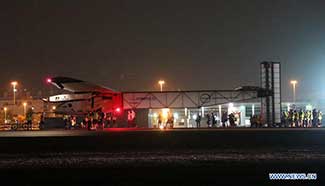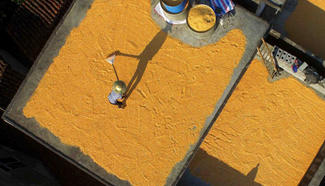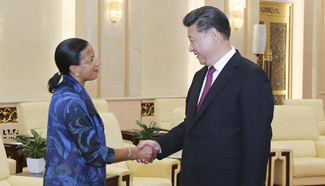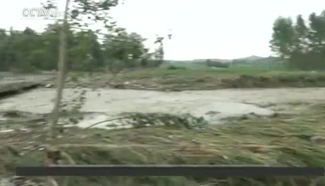by Fatima AbdulKarim
RAMALLAH, July 26 (Xinhua) -- Israeli Defense Minister Avigdor Lieberman scolded the chief of the Israeli public Army Radio days ago after it aired a discussion of a poem by late Palestinian poet Mahmoud Darwish.
According to Israeli media reports, Lieberman told the Army Radio commander that under the same logic, the radio might as well discuss the literary merits of Hitler's book Mein Kampf (My Struggle).
The report became central to a row between the Army Radio, proponents of freedom of press and right wingers in the top political level in Israel, generating dozens of posts in social media.
Last Tuesday, the Army Radio featured Darwish in its "fundamental Israeli texts" program. The radio station defended itself, saying in a statement that its educational broadcasts sought to "enrich and engage" the listeners with a variety of ideas.
Palestinians slammed the remarks by Lieberman, and considered them insulting.
Chairman of the Board of Trustees of Mahmoud Darwish Foundation Ziad Abu Amr said that these statements show the racism running down the Israeli institute.
"Lieberman's statement is an indicator of racist tendencies, and tendencies of discrimination. If anything at all, this proves the false claim that democracy and cultural pluralism are enjoyed by everybody alike in Israel," he said.
The poetry and prose of Darwish were translated to over 30 languages, including Hebrew. It is not unusual that the poetry of the controversial man is read and discussed in Israel.
The six-stanza poem Identity Card, broadcasted by the Israeli Army Radio, was first read by Darwish in Nazareth in 1965 during an event held to mark the Labor Day.
Its first stanza reads: "Write down!/I am an Arab/and my identity card number is fifty thousand/I have eight children/and the ninth will come after a summer/will you be angry?"
Darwish, viewed as a national icon, is widely beloved in Palestine and the world. He was born in Al-Birweh village in the Galilee in 1941.
Although he fled to south Lebanon with his family shortly in the wake of the 1948 war, he returned months later and found his hometown had been demolished in the war.
He studied in Haifa and his highly political orientation led him to the ranks of the Israeli communist party, later becoming the party's newspaper's editor in chief.
During his years in Haifa, he was banned by the Israeli authorities from traveling and was placed under house arrest several times between 1967 and 1970.
When he was finally allowed to leave Israel, he was relocated to Cairo, and then he was offered a scholarship to study at the University of Moscow. He was never allowed back into Israel.
His poetry and prose have come to resemble the anguish over dispossession, exile and struggle for Palestinians.
Darwish joined the Palestine Liberation Organization (PLO) in 1973 and made it to top ranks in a short time. One year after the breakout of the first Intifada, or Uprising, in the occupied territories, Darwish wrote the text of the Palestinian Declaration of Independence, proclaimed by Yasser Arafat on Nov. 15, 1988.
The progressive and highly sentimental text became a symbol for Palestinian identity, struggle against occupation, and the idea of statehood.
Mahmoud Darwish died in the United States in August 2008, a few days after a heart surgery. The Palestinian government declared three days of national mourning to honor the man who was appreciated by the various segments of the Palestinian political and social spectrum.
His funeral was held in Ramallah, where he was buried, in official state processions.
On an overlooking hilltop in Ramallah with remarkable scenery, an architectural masterpiece hosts the mausoleum of Darwish and garden, where a monument stands with large, almost plain tombstone that beholds a verse of his own poetry that says "The effect of the butterfly cannot be seen, the butterfly effect will never fade away."
The monument lies in between a hall dedicated for public cultural events, and on the other side a museum dedicated for the memory of Darwish's life, featuring awards, hand written texts and manuscripts of poems, letters, prose and the highly cherished original manuscript of the 1988 Declaration of Independence.
All of these, says the museum Director Sameh Khader, come to defy the statements of the Israeli defense minister, who compared a peace dove to someone like Hitler.
He said the mission of the museum is to build on his legacy and open the door towards more creativity in the field of culture in Palestine.










